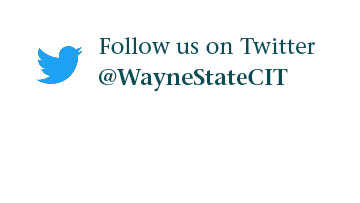How to stay safe online while shopping and gathering virtually this holiday season
As you check items off your shopping list this year, remain mindful of how your online actions affect the entire Wayne State community. With virtual learning and working, scammers who gain access to your personal devices may also gain access to the Wayne State systems and services you use — and any data they house.
Ecards
Ecards are one way scammers will try to get your information. At this time of year, we see an increase in phishing attacks disguised as virtual holiday greeting cards with hidden malicious intent. The sender of these greeting cards may look legitimate, but before opening an attachment take an extra look at the contents of the email and ask yourself: Would the person the card is supposed to be from normally send this sort of message?
Fake package tracking
Another thing to be aware of while shopping online is messages that contain fake tracking information. These often claim there is a problem with the shipment and request that you supply personal information or open an attachment to get things back on track. The best way to avoid falling victim to this scam is to visit the carrier’s website — for example, fedex.com, ups.com, or usps.com — or contact the seller directly instead of clicking on links or attachments in an email.
Zoom bombing
As we have learned this year, our Zoom gatherings are also a common target for scammers. As we gather to celebrate with our friends and family virtually, remember to secure your meeting using Zoom’s Passcode or Waiting Room feature and do not publicly share your meeting info on social media or other sites accessible to people you don't know.
Purchase from secure sites
If you are shopping online, remember to always check site addresses for https://. The ‘S’ in a web address like this stands for secure, and any website with this in its address — and the little padlock alongside it — is certified as a secure domain to visit and purchase from.
Secure holiday guide
The Mozilla Foundation offers a wonderful shopping guide called Privacy Not Included, which informs users of privacy threats that come with internet-connected devices, including smart speakers, video doorbells, smartwatches, gaming systems, and many other types of devices (sometimes called the Internet of Things). We recommend using this resource before shopping online; find it at foundation.mozilla.org/en/privacynotincluded/.
Report suspicious emails
As always, if you are ever suspicious of a message that you receive in your Wayne State inbox, delete it or use the Outlook reporting functions to report it to both Microsoft and C&IT. Every time you report a scam message, it helps us protect the Wayne State community from that scam and others like it.
